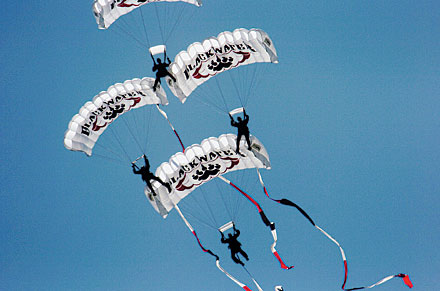Inside America's Private Army
Blackwater parachuted onto the public stage in a flashy way this spring at the Virginia Gold Cup horse race in Northern Virginia. The show marked a turning point for a company that has long preferred its privacy. CHRIS CURRY PHOTOS
Blackwater says one of the goals of its parachute team is to interest children in military careers, particularly special operations. The Gold Cup jump was the team’s first public U.S. demonstration. The members, who were veterans in the field before joining Blackwater, have made a combined 36,000 jumps.
“Wow,” says John O’Rourke of Watson Wyatt Worldwide, a management consulting company. “Can’t say I’ve ever heard of Blackwater before, but that jump was phenomenal.”
“Stirring,” adds O’Rourke’s wife, Jenine.
The couple are leaning on a fence, watching as their two children join other kids invited to help the jumpers repack their chutes.
“Isn’t that sweet?” Jenine says.
Impressing the power brokers is more important. Unlike the military, Blackwater must woo its customers. The well-heeled crowd at the steeplechase is flush with the right kind of people – VIPs who could pave the way for a government contract, buy the company’s new products or use its personal bodyguard service themselves.
Blackwater’s hospitality tent buzzes with invitation-only guests. Gathered around white linen tablecloths, they network and nosh hors d’oeuvres. A few stout-looking men dressed in suits stand sentinel, arms crossed , the coiled wire of an earpiece disappearing into the back of their collars.
Erik Prince, the company’s reclusive founder, is reportedly in attendance, but as usual, he steers clear of the spotlight.
Later, Taylor asks a newspaper photographer if he managed to snap any pictures of Prince at the race.
The answer is no. Taylor grins.
“Good. Then we did our job.”
Prince may choose to stay in the background, but his company is bent on polishing its image. A good reputation makes domestic work, like the Katrina contract, easier to line up. It can offset character-damaging accusations, like the two yet-to-be settled lawsuits that portray the company as callous and inept.
Blackwater wants all doors open. The company says it has more than two dozen projects under way, an almost dizzying pursuit of new frontiers.
Among them:
In addition to its ongoing assignments guarding American officials and facilities in Iraq and Afghanistan, Blackwater has won contracts to combat the booming opium trade in Afghanistan and to support a SEAL-like maritime commando force in Azerbaijan, an oil-rich former Soviet republic.
On the home front, Hurricane Katrina’s $73 million purse has persuaded Blackwater officials to position themselves as the go-to guys for natural disasters. Operating licenses are being applied for in every coastal state of the country. Governors are being given the pitch, including California’s Arnold Schwarzenegger, whom a Blackwater official recently visited to discuss earthquake response.
“We want to make sure they’re aware of who we are and what we can bring to the table,” said Seamus Flatley, deputy director of Blackwater’s new domestic operations division. “We want to get out ahead of it.”
Last year, the company opened offices in Baghdad and Amman, Jordan. More recent expansion plans call for a Blackwater West in Southern California and a jungle training facility at the former Subic Bay naval base in the Philippines.
Image is already affecting the Philippines deal. News reports out of the area indicate strong local opposition, fueled by fears of an influx of “mercenaries.” A Filipino senator says he intends to investigate accusations that Blackwater is recruiting his countrymen for security jobs in Iraq; the Filipino government forbids its citizens to work there.
Taylor said the locals are overreacting. Clients at Subic and the type of training offered there will be subject to Defense Department oversight.
“We will only teach who and what the U.S. government wants us to,” he said.
Taylor also denied accusations that Blackwater is using its toehold at Subic Bay to recruit for Iraq.
“Why does everyone think that?” Taylor asked. “Why can’t we just be offering training in that part of the world?”
The company confirms that it does recruit in foreign lands. Taylor said Blackwater has hired roughly 20 Filipinos for guard duty in Afghanistan, where there is no ban on such work.
A few years back, Blackwater created a diplomatic embarrassment for Chile by recruiting Chileans who had trained under the ousted regime of military dictator Augusto Pinochet. The new Chilean government was concerned about its country’s reputation abroad and worried that the former henchmen of a toppled dictator would not represent it well.
Similar concerns surface here at home about the way America’s private military companies represent the country overseas.
Thomas X. Hammes, a retired Marine colonel, encountered U.S. contractors during his 2004 tour of duty in Iraq. To the Iraqi people, Hammes said, those contractors were America:
“We are held responsible in the people’s eyes for everything they do, or fail to do.”








0 Comments:
Post a Comment
<< Home